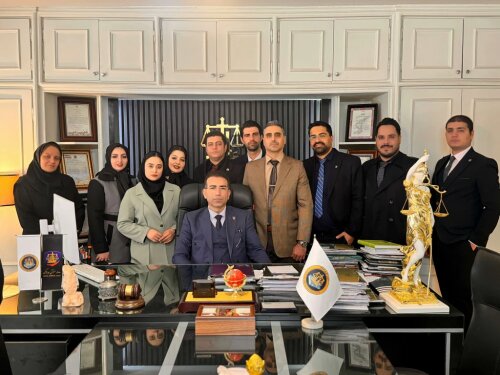Best Child Visitation Lawyers in Mashhad
Share your needs with us, get contacted by law firms.
Free. Takes 2 min.
Free Guide to Hiring a Family Lawyer
List of the best lawyers in Mashhad, Iran
About Child Visitation Law in Mashhad, Iran
Child visitation law in Mashhad, Iran is governed primarily by the national civil code and family law regulations, with additional local interpretations by Mashhad family courts. These laws are designed to protect the rights of children to maintain relationships with both parents after separation or divorce. Generally, one parent is granted custody (known as “hizanat”), while the other parent is given visitation rights. The visitation schedule and conditions aim to be in the child’s best interests, considering their welfare, emotional needs, and overall well-being.
Why You May Need a Lawyer
Dealing with child visitation matters can be complex and emotionally challenging. You may need a lawyer in situations such as:
- Disputes over visitation schedules
- Denial of court-ordered visitation
- Requests to modify visitation arrangements due to a change in circumstances
- International visitation and travel concerns
- Concerns about the child’s safety during visitation
- Enforcement of visitation rights
- Negotiation and drafting of formal visitation agreements
- Cases involving parental relocation
- Establishing visitation rights for grandparents or other relatives in specific cases
- Complex family dynamics including remarriage or blended families
A qualified lawyer can advocate for your rights, help mediate disputes, represent you in negotiations and court, and ensure you understand your legal options under Mashhad’s jurisdiction.
Local Laws Overview
Key aspects of local child visitation law in Mashhad include:
- National Framework: Iranian Civil Code Articles 1169 to 1179, which dictate custodial and visitation rights
- Custodial Parent: Traditionally, custody of young children (especially those under 7 years old) is granted to mothers, with fathers receiving visitation
- Best Interests of the Child: All court decisions must prioritize the child’s health, emotional well-being, and educational needs
- Visitation Orders: Courts can specify detailed visitation arrangements, including dates, times, and supervision if necessary
- Modification and Enforcement: Either parent can apply for changes to the visitation order if there are significant changes in circumstances or disputes about compliance
- Geographical Restrictions: Local courts may impose travel restrictions or conditions if there is a risk of the child being taken out of Mashhad or Iran without consent
- Role of Mediation: Mashhad family courts often encourage or require mediation before formal hearings
Familiarity with these laws is essential for parents and guardians navigating visitation matters in Mashhad.
Frequently Asked Questions
What is child visitation and how is it decided in Mashhad?
Child visitation is the legal right of a non-custodial parent to spend time with their child. Decisions about visitation are made by the family court, prioritizing the child’s best interests and based on the circumstances of each family.
Who usually gets custody and who gets visitation rights?
Typically, mothers receive custody of young children, and fathers are granted visitation. After children reach a certain age, custody may be reconsidered. The non-custodial parent receives visitation unless there are serious concerns for the child’s safety.
How are visitation schedules determined?
Schedules are flexible, depending on parents’ and children’s routines. Courts may order weekly, bi-weekly, or holiday visits. The specifics are outlined in the court order or mutual agreement.
Can visitation rights be denied?
Visitation rights can only be denied for strong reasons, such as evidence of harm or threat to the child. The court will assess the situation and may order supervised visitation in such cases.
Can a parent modify a visitation order?
Yes, either parent can petition the court to modify a visitation order if circumstances change or if current arrangements are no longer in the child’s best interest.
What happens if one parent violates a visitation order?
The affected party can file a complaint with the court. The court may enforce the order and apply legal penalties for noncompliance, which may include fines or changes in custody arrangements.
Is mediation required before going to court for visitation disputes?
Mashhad family courts often require or strongly encourage mediation to resolve disputes before proceeding to formal court hearings.
What rights do grandparents or other family members have to visitation?
Grandparents and close relatives may seek visitation rights, but these are granted only in special cases where it clearly benefits the child and does not conflict with parental custody decisions.
Can I take my child outside Mashhad or abroad during visitation?
Travel with the child may require the custodial parent’s permission. If there are concerns about abduction or disagreements, the court may restrict travel or require certain guarantees.
How can a lawyer help with child visitation issues?
A lawyer can assist by advocating for your rights, negotiating with the other parent, helping prepare legal documents, and representing you in court or mediation proceedings.
Additional Resources
If you are dealing with child visitation matters in Mashhad, the following resources may be helpful:
- Mashhad Family Court (Dadgah Khandani Mashhad): Handles family law cases including custody and visitation
- Iranian Legal Aid Organizations: Provide free or low-cost legal guidance, especially for women and children
- Local Bar Association (Kanoon Vokala Mashhad): Offers referrals to qualified family law lawyers
- Mashhad Social Services: Available for mediation and counseling support
- Ministry of Justice (Vezarat-e Edalat): National resource for legal procedure guidelines and documentation
Next Steps
If you need legal assistance regarding child visitation in Mashhad, consider these steps:
- Document all relevant information about your child and current arrangements
- Contact a qualified family law lawyer in Mashhad for a consultation
- If safe and possible, communicate with the other parent to explore mutual agreements
- Seek mediation services if recommended or required by the court
- File a petition with the Mashhad family court if disputes cannot be resolved informally
- Utilize available support services, such as counseling and local legal aid, during the process
Acting promptly and with the guidance of an experienced lawyer can help ensure the best possible outcome for your child and family.
Lawzana helps you find the best lawyers and law firms in Mashhad through a curated and pre-screened list of qualified legal professionals. Our platform offers rankings and detailed profiles of attorneys and law firms, allowing you to compare based on practice areas, including Child Visitation, experience, and client feedback.
Each profile includes a description of the firm's areas of practice, client reviews, team members and partners, year of establishment, spoken languages, office locations, contact information, social media presence, and any published articles or resources. Most firms on our platform speak English and are experienced in both local and international legal matters.
Get a quote from top-rated law firms in Mashhad, Iran — quickly, securely, and without unnecessary hassle.
Disclaimer:
The information provided on this page is for general informational purposes only and does not constitute legal advice. While we strive to ensure the accuracy and relevance of the content, legal information may change over time, and interpretations of the law can vary. You should always consult with a qualified legal professional for advice specific to your situation.
We disclaim all liability for actions taken or not taken based on the content of this page. If you believe any information is incorrect or outdated, please contact us, and we will review and update it where appropriate.










